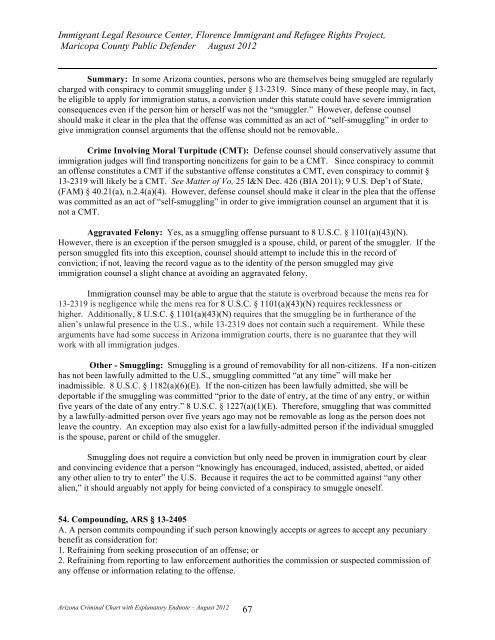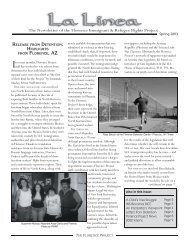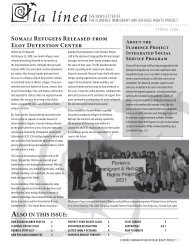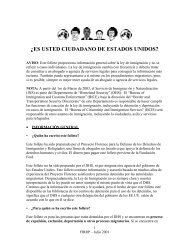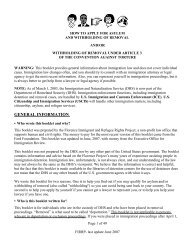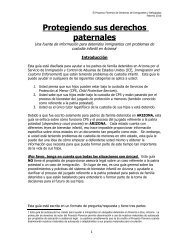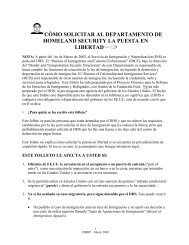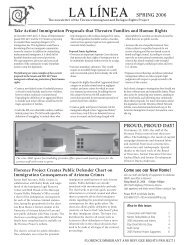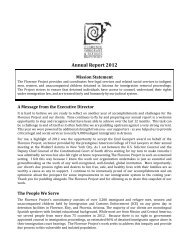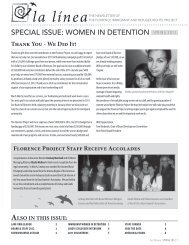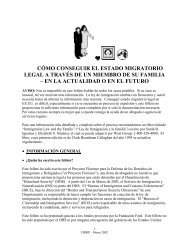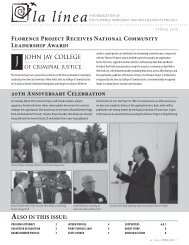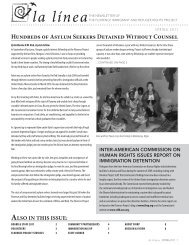quick reference chart and annotations for determining immigration ...
quick reference chart and annotations for determining immigration ...
quick reference chart and annotations for determining immigration ...
You also want an ePaper? Increase the reach of your titles
YUMPU automatically turns print PDFs into web optimized ePapers that Google loves.
Immigrant Legal Resource Center, Florence Immigrant <strong>and</strong> Refugee Rights Project,<br />
Maricopa County Public Defender August 2012<br />
Summary: In some Arizona counties, persons who are themselves being smuggled are regularly<br />
charged with conspiracy to commit smuggling under § 13-2319. Since many of these people may, in fact,<br />
be eligible to apply <strong>for</strong> <strong>immigration</strong> status, a conviction under this statute could have severe <strong>immigration</strong><br />
consequences even if the person him or herself was not the “smuggler.” However, defense counsel<br />
should make it clear in the plea that the offense was committed as an act of “self-smuggling” in order to<br />
give <strong>immigration</strong> counsel arguments that the offense should not be removable..<br />
Crime Involving Moral Turpitude (CMT): Defense counsel should conservatively assume that<br />
<strong>immigration</strong> judges will find transporting noncitizens <strong>for</strong> gain to be a CMT. Since conspiracy to commit<br />
an offense constitutes a CMT if the substantive offense constitutes a CMT, even conspiracy to commit §<br />
13-2319 will likely be a CMT. See Matter of Vo, 25 I&N Dec. 426 (BIA 2011); 9 U.S. Dep’t of State,<br />
(FAM) § 40.21(a), n.2.4(a)(4). However, defense counsel should make it clear in the plea that the offense<br />
was committed as an act of “self-smuggling” in order to give <strong>immigration</strong> counsel an argument that it is<br />
not a CMT.<br />
Aggravated Felony: Yes, as a smuggling offense pursuant to 8 U.S.C. § 1101(a)(43)(N).<br />
However, there is an exception if the person smuggled is a spouse, child, or parent of the smuggler. If the<br />
person smuggled fits into this exception, counsel should attempt to include this in the record of<br />
conviction; if not, leaving the record vague as to the identity of the person smuggled may give<br />
<strong>immigration</strong> counsel a slight chance at avoiding an aggravated felony.<br />
Immigration counsel may be able to argue that the statute is overbroad because the mens rea <strong>for</strong><br />
13-2319 is negligence while the mens rea <strong>for</strong> 8 U.S.C. § 1101(a)(43)(N) requires recklessness or<br />
higher. Additionally, 8 U.S.C. § 1101(a)(43)(N) requires that the smuggling be in furtherance of the<br />
alien’s unlawful presence in the U.S., while 13-2319 does not contain such a requirement. While these<br />
arguments have had some success in Arizona <strong>immigration</strong> courts, there is no guarantee that they will<br />
work with all <strong>immigration</strong> judges.<br />
Other - Smuggling: Smuggling is a ground of removability <strong>for</strong> all non-citizens. If a non-citizen<br />
has not been lawfully admitted to the U.S., smuggling committed “at any time” will make her<br />
inadmissible. 8 U.S.C. § 1182(a)(6)(E). If the non-citizen has been lawfully admitted, she will be<br />
deportable if the smuggling was committed “prior to the date of entry, at the time of any entry, or within<br />
five years of the date of any entry.” 8 U.S.C. § 1227(a)(1)(E). There<strong>for</strong>e, smuggling that was committed<br />
by a lawfully-admitted person over five years ago may not be removable as long as the person does not<br />
leave the country. An exception may also exist <strong>for</strong> a lawfully-admitted person if the individual smuggled<br />
is the spouse, parent or child of the smuggler.<br />
Smuggling does not require a conviction but only need be proven in <strong>immigration</strong> court by clear<br />
<strong>and</strong> convincing evidence that a person “knowingly has encouraged, induced, assisted, abetted, or aided<br />
any other alien to try to enter” the U.S. Because it requires the act to be committed against “any other<br />
alien,” it should arguably not apply <strong>for</strong> being convicted of a conspiracy to smuggle oneself.<br />
54. Compounding, ARS § 13-2405<br />
A. A person commits compounding if such person knowingly accepts or agrees to accept any pecuniary<br />
benefit as consideration <strong>for</strong>:<br />
1. Refraining from seeking prosecution of an offense; or<br />
2. Refraining from reporting to law en<strong>for</strong>cement authorities the commission or suspected commission of<br />
any offense or in<strong>for</strong>mation relating to the offense.<br />
Arizona Criminal Chart with Explanatory Endnote – August 2012<br />
67


